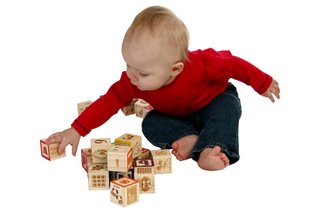When is it too early to start Montessori? As the song says, the beginning is “a very good place to start!” Can you tell I watched The Sound of Music last night? In thinking about this topic, I knew that even among devoted Montessori parents and teachers, very few attempt to do “infant Montessori” because many things that are called for – like crib mattresses on the floor instead of in a crib – run counter to our cultures and our sense of what is acceptable.
So are there any principles of “Montessori from the start” that are easy to bring into any home? I think so. Look at this quote:
“The baby’s fundamental need – precisely because he is a human being – is to be loved. But it takes a mature person to love a baby, because love takes time, love takes patience, love takes fortitude, love even requires a certain kind of humility: to love another better than one’s self. The baby needs time to be understood: he needs time in everything he does.”
The above text was taken from a speech given by Dr. Herbert Ratner, editor of Child and Family, to the American Montessori Society in 1963. Dr. Ratner urged his listeners to understand that in the Montessori infant-parent relationship, it is the parents’ responsibility to learn how they must grow because the baby is born already knowing how to grow. It’s a built-in gift of human nature.
The doctor went on to exhort parents to not to misunderstand Montessori thought as
being a faddish status symbol, something to be gone at halfheartedly with the vague goal of speeding up a child’s intellectual development. Though academic development is certainly an important part of the Montessori method, it is the baby’s emotional development that should be dearest to the hearts of mothers and fathers. The parent must be devoted to the ‘total child’.
Taking her cues from geneticist Hugo de Vries, Dr. Maria Montessori identified four areas of infant development referred to as the ‘sensitive periods’. By carefully preparing an environment in which babies can begin to safely explore these four needs to grow, the parent is acting with great love and wisdom and is fostering a strong sense of emotional well-being in their child. If your family is expecting a new baby, now is the time to consider how you will best serve your baby’s needs in the following four sensitive periods.
Sensitive Period for Movement
 Even before birth, babies are testing out their limbs, their reflexes and gross motor skills. From birth to 12 months, this joyous exploration of the body’s power progresses from kicking and stretching to being able to use the little fingers as pincers to pick up all kinds of interesting objects. Control of the hands and feet, self-support of the head, hand-eye coordination and the miracle of crawling all come into play in the first year of life.
Even before birth, babies are testing out their limbs, their reflexes and gross motor skills. From birth to 12 months, this joyous exploration of the body’s power progresses from kicking and stretching to being able to use the little fingers as pincers to pick up all kinds of interesting objects. Control of the hands and feet, self-support of the head, hand-eye coordination and the miracle of crawling all come into play in the first year of life.
Montessori thought teaches that the parents’ main responsibility in all this activity is to make sure that babies are not being restrained either by their clothing or by furnishings like cribs or playpens. Soft, cotton clothing that enables free range of the limbs is best. The parents need to be very thorough in baby-proofing the environment so that the baby is able to move about the house in designated areas. Simple wooden toys, mobiles and safe household objects can all honor babies’ needs to reach out for what delights them. In an upcoming article, I’ll be writing more about the basics of the Montessori nursery.
Sensitive Period for Sensory Perception
An infant’s perception of sound, sight, touch, taste and smell is fresh, new and acute. Montessori parents turn a cold shoulder to the commercial manufacturers of infant toys that flash, erupt in electronic sound, and are made of lifeless plastic and other synthetics. These objects are simply overwhelming for a new baby’s sensory experience of the world. Keeping things calm and quiet, keeping manufactured stimuli to a minimum, and giving priority to a newborns’ most important connection to their human parents is key.
 As babies begin to take interest in a wider range of things beyond their mother and father, less is still more. In the house, a few chosen toys, pictures, a wonderfully soft blanket will be plenty for small babies to explore. Outside, a single flowering plant is like a whole garden to a baby. The goal of Montessori parents is to follow babies’ expressions of interest in new sensory experiences and to go at their pace. As I recently read on a Montessori blog – it’s not about eating, it’s about tasting. Getting to observe and share in a baby’s gradual discovery of the physical world is one of the chief joys of the first years of parenting.
As babies begin to take interest in a wider range of things beyond their mother and father, less is still more. In the house, a few chosen toys, pictures, a wonderfully soft blanket will be plenty for small babies to explore. Outside, a single flowering plant is like a whole garden to a baby. The goal of Montessori parents is to follow babies’ expressions of interest in new sensory experiences and to go at their pace. As I recently read on a Montessori blog – it’s not about eating, it’s about tasting. Getting to observe and share in a baby’s gradual discovery of the physical world is one of the chief joys of the first years of parenting.
Sensitive Period for Language
Even before birth, many babies react to sounds they perceive going on in the outside world. Often, Montessori parents take care to sing, talk and read to their children before their ‘arrival’. After birth, babies find themselves in a world of sounds and often, their greatest interest is in the sounds of human speech coming from their parents. Infants intently watch the mouths of the people around them and begin moving their own lips in imitation. Soon, they begin to explore their own ability to create different kinds of sounds and develop a fascinating repertoire of syllables that they will repeat over and over, trying to perfect the control of their throat, tongue and lips.
It’s crucial that parents spend plenty of time talking to baby, one-on-one, and I have watched babies’ faces fill with gratification when someone else repeats their own sounds back to them, speaking their language. Being part of the conversation helps infants feel that they are integral to the family – valued members of the household. Parents should not be overly concerned about when their children master their first word. They will do this at the right time for them.
Sensitive Period for Order
I have found that it is this last sensitive period that comes as the biggest surprise to new parents. To explain this concept simply, newborns start to gain a feeling of security by making sense of all of the things they perceive in their surroundings, be this people or furnishings. Their own place in the scheme of things feels safe when they wake up from a nap and discover that everything is in its rightful location. As one Montessori mom’s blog describes, even adding a new picture to an infant’s wall can cause him to feel unsettled, threatened, bewildered – the world is in disorder!
In my own experience, I can remember a baby in the family who began screaming and crying when his mother put her hair in a bun on top of her head for the first time. The baby felt something was terribly wrong with his mother and only calmed down when Mom took her hair down. I’ve seen babies react similarly to fathers changing their facial hair or putting on glasses. My own daughter used to cry if my husband came in the door wearing a baseball cap. She wouldn’t let him hold her until he took it off. Obviously, some changes are necessary, but optional changes in the environment should be made with care.
If an infant becomes suddenly discontented or fussy and no explanation is immediately obvious, it’s a good idea to look around to see if something has changed in the room that could be causing distress. And, as baby begins to crawl about the house, it’s time to start teaching the idea of everything having a dedicated place in the home. One Montessori mother wondered what to do with the carpet fuzz her son kept picking up with such delight. A friend suggested she take interest in the fuzz and then demonstrate that the place for it was in the wastebasket (rather than in the mouth!). Even fuzz can have a place to go and it is very satisfying to babies to gain confidence about how the environment is ordered. It fosters feelings of both capability and certainty.
In Conclusion
Dr. Montessori believed that these special sensitive periods were at their keenest from birth to five years of age. An extraordinary amount of development takes place in the first year of life, both for the growing child and for the parent who is striving to identify and fulfill the baby’s needs. Every parent will make some mistakes along the way, but ideally, parents perfect their own skills as givers of love and opportunity with dedicated practice. Just as babies come equipped with an agenda for their own correct growth, we adults have a built-in ability to care for our young when we become careful observers. By following the child (or in this case, the baby), we will do our best work.
Helpful Resources:
The Secret Life of the Unborn Child by Thomas Verny and John Kelly – this book is a little outdated (written in 1982), and makes some claims that are probably unverifiable. Still, it’s an interesting read and a great reminder that children are very aware of their environment even before they’re born.
The Scientist in the Crib: What Early Learning Tells Us About the Mind by Alison Gopnik, Andrew Meltzoff, and Patricia Kuhl – I found this book to be a fascinating look at how babies learn. Backed up by extensive research, but written in an engaging and readable style.

